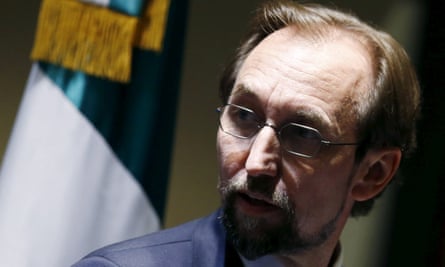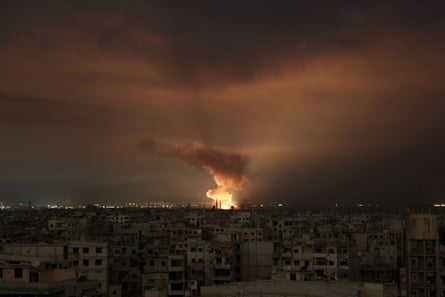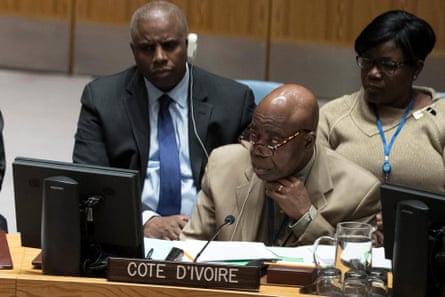Donald Trump’s anti-press rhetoric is “very close to incitement to violence” that would lead to journalists censoring themselves or being attacked, the outgoing UN human rights commissioner has said.
Zeid Ra’ad al-Hussein, a Jordanian prince and diplomat, is stepping down this month as UN high commissioner for human rights after deciding not to stand for a second four-year term, in the face of a waning commitment among world powers to fighting abuses.
Zeid said the Trump administration’s lack of concern about human rights marked a distinct break with previous administrations, and that Trump’s own rhetoric aimed at minorities and at the press was redolent of two of the worst eras of the 20th century, the run-up to the two world wars.
In an interview with the Guardian, he singled out the US president’s repeated designation of the press as “the enemy of the people”.
“We began to see a campaign against the media … that could have potentially, and still can, set in motion a chain of events which could quite easily lead to harm being inflicted on journalists just going about their work and potentially some self-censorship,” Zeid said. “And in that context, it’s getting very close to incitement to violence.”

He said it would be up to a court but determine whether Trump was actually guilty of incitement depending on the circumstances, if say, a journalist was stabbed while covering a rally. He said Trump’s example was already being followed elsewhere, giving license to authoritarian leaders to crack down on the media in ways they had not previously dared to. Zeid pointed to the Cambodian leader, Hun Sen, who he said had used similar language when he closed down independent media organisations.
“The US creates a demonstration effect, which then is picked up by other countries where the leadership tends to to be more authoritarian [in] character or aspires to be authoritarian,” he said.
Zeid has also taken on the Trump administration over its policy of separating children from their parents in migrant families arrested at the border, and Trump’s own long history of rhetoric aimed at minorities.
“When language is used in a way that focuses on groups of people who have traditionally suffered a great deal from bigotry and prejudice and chauvinism, it harked back to a period not too long ago in the 20th century when feelings were stoked, directed at a vulnerable group for the sake of political gain,” he said, adding that he was referring in particular to the 1930s and the period before the first world war.
Zeid began his tenure as UN human rights commissioner in 2014 during the Obama administration and said his contacts with the state department dropped off significantly after Trump took office in January 2017.

“The Trump administration seems to have separated itself from previous administrations in its upholding of human rights globally,” Zeid said. The administration’s failure to appoint an ambassador to the Human Rights Council in Geneva, before withdrawing from the council altogether, he added, was “illustrative of the lack of any deep commitment to the human rights”.
TimelineThe Syrian war
Show
Unprecedented protests demand civil liberties and the release of political prisoners after four decades of repressive rule by the Assad family. The regime represses demonstrations in Damascus and the southern city of Deraa but protests continue.
Defecting army colonel Riad al-Asaad sets up the Turkey-based rebel Free Syrian Army. Islamist groups join the revolt.
Regime forces take control of the rebel stronghold in Homs after a month of bombardment. Other bloody operations are carried out, notably in the central city of Hama, after massive anti-regime protests.
More than 1,400 people die in a chemical weapon attack on rebel-held districts near Damascus.
The US and Assad ally Russia agree a plan to eliminate Syria's chemical weapons, averting punitive US strikes against the regime.
Hostilities between jihadists and rebel groups turn into an open war in the north. The group that will become known as Islamic State takes Raqqa – the first provincial capital to fall out of regime control – from rebel forces.
A US-led coalition launches airstrikes against Isis in Syria. The strikes benefit Kurdish groups, which since 2013 have run autonomous administrations in Kurdish-majority areas.
Russia launches airstrikes in support of Assad's troops, who are on the back foot. Russian firepower helps turn the tables for the regime, which begins to retake rebel-held territory.
The regime retakes Syria's second city, Aleppo.
Russia and Iran, as backers of the Syrian regime, and Turkey, a supporter of the rebels, organise talks in Kazakhstan, between representatives of both sides. The process leads to the creation of four "de-escalation zones".
A sarin gas attack on the rebel-held town of Khan Sheikhun kills more than 80 people, prompting Washington to attack a regime airbase.
Further complicating an already drawn-out conflict, Turkey launches an operation against the Kurdish People's Protection Units which, with US support, played a key role in beating back Isis.
Regime launches a ferocious assault on the remaining rebel-held enclave near Damascus, eastern Ghouta. In under four weeks, the Russian-backed onslaught kills more than 1,200 civilians.
US president Donald Trump surprises advisors and allies alike by declaring victory over the Islamic State and promising to withdraw US troops from the conflict.
The Syrian Democratic Forces (SDF) announce that they have driven Isis out of their final stronghold of Baghuz. At least 11,000 SDF fighters, a Kurdish-led militia which includes Arab, Syriac and Turkmen units, have died in the four-year military campaign against the group in Syria.
Britain and France agree to deploy additional special forces in Syria to allow the US to withdraw its ground troops from the fight against remaining Isis forces in the country.
Rebels withdraw from Khan Sheikhun in north-west Syria, clearing the way for pro-government forces to enter the town – a key moment in the war for Idlib province, the country’s last major rebel stronghold.
Zeid has been an outspoken critic of governments around the world for their human rights records, but his tenure as high commissioner has coincided with the catastrophic failure of the UN Security Council to halt mass killings in Syria or Yemen, and the relegation of human rights as a priority at the UN in general, where it accounts for just 3% of overall spending.
A pivotal moment came in March when Zeid was blocked from even addressing the Security Council on human rights in Syria, where more than half a million people have been killed in seven years of violence.
Russia and China were adamantly opposed but the French delegation was confident it had the nine votes necessary for the session to go ahead.

However, with less than a minute to go and Zeid primed to speak, the ambassador from the Ivory Coast informed his French counterpart he had changed his mind and would abstain. The session was called off. The Ivorean government insisted that its diplomat, Bernard Tanoh-Boutchoue, had acted without its permission. Western diplomats became convinced that Tanoh-Boutchoue, who had previously served as ambassador to Moscow, had come under pressure from Russia to switch his vote, but the mystery was never resolved. The 67-year-old diplomat died in New York of a sudden illness, said to be a heart attack, a month after his controversial abstention.
Zeid said he never understood the machinations behind the vote, but said it reflected a broader trend.
“It tells me more about the weakening influence of the western powers that they could not secure nine votes for a briefing on human rights in Syria,” he said. “If you are discussing Syria in the security council and you are not discussing gross human rights violations, what are you discussing? The latest arts and crafts fair in Damascus? It’s ridiculous.”
Zeid’s has often been a lonely voice. Hopes that the current secretary general, Antonio Guterres, would be more outspoken on human rights than his predecessor, have been dashed, a western diplomat at the UN said.
“There is a complete separation of what Zeid said and what the secretary general says, and his impact has been reduced because of that,” the diplomat said. “And there a broader problem of the ability of human rights abuses to shock and lead to a change of policy. That link has been broken. Actors who should have listened to Zeid, have not.”
Zeid said he came to the decision early on in his tenure to speak out on human rights abuses irrespective of the political circumstances. He attributed his approach in part to his first major foreign mission as a UN official in his early 30s, when he witnessed first hand UN dithering and timidity during the fall of the Muslim enclave of Srebrenica, and the subsequent slaughter of some 8,000 men and boys by Bosnian Serb troops.

“We felt that there were periods of silence and that was painful for the UN and the UN was not respected ultimately by the parties to the conflict and therefore we saw the disasters that came from it,” Zeid said. “And … if the UN is not respected, the UN is rolled over to my mind. You don’t earn anyone’s respect by being silent.”
Zeid’s advice to his successor, Michele Bachelet, who has been both a political prisoner and president in her native Chile, is to stay courageous and not to run for a second term.
“I would be very suspicious of any commissioner seeking a second term because I’d wonder what deals are being struck and if they’d been struck they’ve been struck on the back of victims,” he said.
The job of bearing witness to crimes against humanity also takes an emotional toll. Zeid recalled a trip to Mexico to speak to the families of 43 students who were abducted and presumed murdered by a criminal gang in 2014.
“I was listening to mothers and fathers, siblings, speak of those who were disappeared and presumably killed. After that, I had a series of interviews and I wasn’t in the right emotional state to actually give the interview because there was something deep within me where I felt I was a fraud,” Zeid said. “That given the enormity, the colossal nature of their suffering … with us they wanted salvation … they want an end to suffering. They want us to do something that is many respects almost impossible to do. That is where most of the pressure comes from in this job.”
